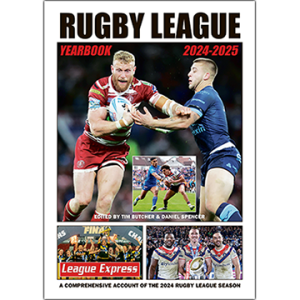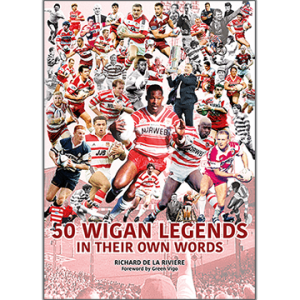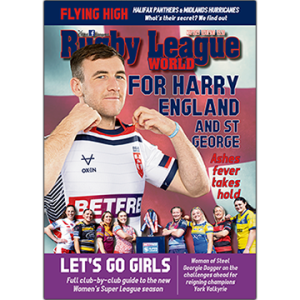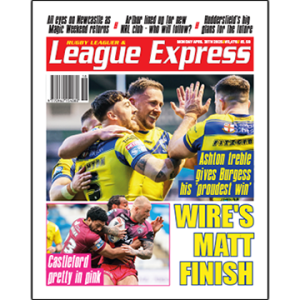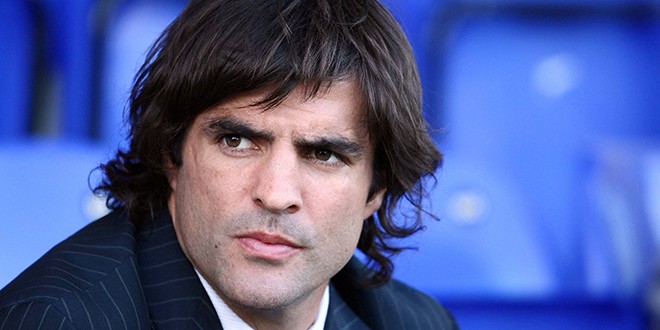
This article originally appeared in issue 399 of Rugby League World magazine.
Heard the one about the Yorkshireman and the Irishman who sit down to discuss the strengths of Rugby League? Jamie Jones-Buchanan spends a revealing afternoon with charismatic Sky Sports presenter Brian Carney
A couple of weeks ago I went to see “Playing the Joker”, the story of Eddie Waring, the Dewsbury man branded as the idiosyncratic commentator who gave Rugby League a national identity.
Waring retired the year of my birth so I knew little of him, though I knew only too well the sound of Eddie’s voice from the 1968 “Watersplash” Challenge Cup final between Wakefield and Leeds, after which the phrase “poor lad” became famous following Don Fox’s late conversion miss.
“The game should be proud of its origins. The roots are fantastic.”
I was educated by this play and took from it a great sense of identity and pride both from my northern roots and my involvement in this amazing game. I was entertained at how this local, abstract character was the voice of Rugby League to the rest of the nation. Then I became frustrated and even incensed at the question whether the northern stereotype – that he may have used to his advantage – was good or bad for the game.
We have two major soaps set in the north, neither of which have changed over the years in terms of how northerners are perceived to the rest of the world. The urban version is that we live in back-to-back houses and work in the local knickers factory at the end of the street. The rural version is the feuding family with jet-black hair grafting with sheep all day before meeting in the local pub to scheme against the local land owners.
I want Rugby League to be as good as it can be as much as anyone else, but if your heart isn’t in good health then the rest of your body has little chance of thriving. Too many arteries in our “heartlands” are in too poor health to be worrying about the rest of the world. I’m not bothered what the rest of the world thinks of our identity because we are who we are, and events like the Magic Weekend should celebrate that.
I was a big fan of this year’s Magic Weekend and spent both days at the Etihad thrilled at the record crowds and being a part of our game in the north. Just a few days before, Brian Carney – who ironically is both a national voice on our game and possibly the best example since Waring of an assimilated outlier to come into Rugby League – was gracious enough to allow me the time to speak to him about this very subject, whilst introducing me to culinary delights hugely foreign to the familiar Yorkshire pudding – sushi.
Immediate trailblazer
We started with the Eddie Waring play, and the discussion it raises about League being a northern sport.
“I haven’t seen the play but I have heard of it,” Brian said. “This is a topic the deeply interests me. I have in this year and the last, not so much given up but I’m less agitated by the subject than I used to be. I’d hate to say that I have conceded.
“My thoughts were along these lines from the very start. The sport has its origins certainly in the north of England but that’s not to say it couldn’t spread to Australia, New Zealand and the south of France, so no one will be able to convince me that they’re not positives.
“It ties into the bigger problem that we don’t seem to have had a coherent plan – certainly for the time that I have been in the game – where people know exactly what they want to do.
“My first involvement in Rugby League was with an expansion team in Gateshead. So straight off the bat I was immersed in trying to spread the game of Rugby League and when I moved from Gateshead to Hull I found out what it meant, in inverted commas, to be in a Rugby League city or town. People were wearing the jerseys in the street people were interested in talking about it, and if you had a bad game you had better keep your head down for a couple of days.
“A coach or a media officer can take it upon themselves to make the decision that the players are not going to do an interview. Then we moan about not having a profile.”
“I found out what it was about, then I moved to Wigan then Australia and was exposed to the greater profile that Rugby League has over there. When I had time to stop and reflect I always got a bit annoyed that we didn’t stop and focus more on the heartlands of the game. There would be nothing better to sell our game to the rest of the country than if you couldn’t get a ticket for our game in our heartlands.
“I can’t remember the last advertising slogan at a club where they boasted that it’s sold out every year. I’m a casual Premier League supporter but I still know the anecdotal evidence that there’s a waiting list for a Manchester United season ticket.
 “Man United supporters marched against the new owners but they still sold every season ticket. Now Leeds, Wigan get some great attendances but I haven’t seen anyone repeatedly sell out for games, and all too often on Sky we have been told it’s heading for a sell out but there turns out to be a lot of empty seats and that is what disappoints me a bit. They say if you can’t love yourself how can you expect anyone else to love you.
“Man United supporters marched against the new owners but they still sold every season ticket. Now Leeds, Wigan get some great attendances but I haven’t seen anyone repeatedly sell out for games, and all too often on Sky we have been told it’s heading for a sell out but there turns out to be a lot of empty seats and that is what disappoints me a bit. They say if you can’t love yourself how can you expect anyone else to love you.
Strengthening the roots first
“I keep hearing that some of these places are Rugby League towns or cities, but there is a lot of evidence to the contrary which is worrying. Hull is a strong example of a Rugby League city and Johnny Whitely once pointed it out to me, ‘Brian if you get Hull KR at home and Hull FC at home on different days of the weekend, you might have 20,000 people or more going to watch live Rugby League’.
“Leeds have Leeds United to compete with but they still get huge crowds, whether we show games on a Monday night or Thursday. There are a lot of other places ‘synonymous’ with Rugby League that aren’t getting the people there, and I’m not sure we have ever explored why, and have done anything about that.
“Yet at the same time we went to Gateshead and into Wales! Are we allowed to pretend that Wales never happened? It seemed to me that it never happened.
“We went there and invested the best part of £5million between the salary cap, TV money and anything the sponsors and supporters brought in. Would that have been better invested somewhere else? If there are people down in the south and you want to convince them that this is a game worth watching then I don’t think there’s a better way to do that than with sold out signs.
“There would be nothing better to sell our game to the rest of the country than if you couldn’t get a ticket for our game in our heartlands.”
“People have a fear of missing out and we are not showing them that they’re missing out on anything. They’re making liars of us sometimes when we say it’s the ‘Greatest Game’, although that’s a subjective statement. We installed the virtues of Rugby League then people turn on and see 3,000 people at a game on TV, and that guts me at times.
“The game should be proud of its origins. The roots are fantastic, and we should also be thankful that the games are played where they are because those areas just happen to have what I believe to be the ‘ideal’ character to have to play this game of Rugby League.
 “It’s a cruel sport. The people I have seen up here – it’s an ideal breeding ground for Rugby League players. We should embrace the history and the heritage but allow people to be interested in it.
“It’s a cruel sport. The people I have seen up here – it’s an ideal breeding ground for Rugby League players. We should embrace the history and the heritage but allow people to be interested in it.
“But at the minute we are showing them clubs going into administration. In a Rugby League town you would think that every business in that town would want to support the club but I guess a lot of them have been burnt so many times.”
Irish beginnings
Ray French was at the same showing of “Playing the Joker”, and was on a Q&A panel at the subsequent dinner as the man who succeeded Eddie Waring, along with the actors and producers of the play. He told us that the last bit of advice Eddie gave him was “to be himself”. It’s what Stevo told us a few months ago, and the type of thing Carney would hear from Matty Johns when over in Australia. Personally I couldn’t agree more.
Ray French helped inspire me into Rugby League as a complete outsider, and through the BBC’s Challenge Cup coverage he did exactly the same for Brian – who lived in a foreign country with no TV!
My question on the night then was: “Can’t Rugby League concentrate on ‘being itself’ – investing all its time, money and energy on its history, heritage and identity in the north?”
I was more or less berated for suggesting that we can survive on our own and it would be detrimental not to continue to take the game to the rest of the world. He put his point across very well to be fair but either I didn’t put my question across properly or he didn’t understand me because I am desperate for lads like Brian Carney to spread the word through gracing us with his talent and unique Irish identity.
My point is instead of pushing the game out like a viral infection, hoping to infect the rest of the world, that the rest of the world should be assimilated through FOMO – “The Fear Of Missing Out”, something Brian alludes to above.
Create something so special we attract the outsider like flowers attract bees to their pollen.
“I played Gaelic football until I came over here,” Brian explained. “I played rugby union in secondary school but I gave it up because none of my mates played it – they all knocked about playing soccer and I wanted to be with them so I gave it up. But when I went to university somebody asked if I wanted to play at a club called Lansdowne to play.
“I wasn’t particularly good but they were nice lads. I broke my collar bone and gave it up because I had a course to do so I was happy enough knocking about with friends then going home to play Gaelic football at the weekend.
One of the coaches down there about three years later said, ‘I know you’re not totally committed to union, but in the summer I have a Rugby League team called the Dublin Blues. When the union season is finished do you want to play for us?’
“My only experience of Rugby League at that time was being in boarding school and watching it on the BBC – I didn’t have BBC in my house. We watched Challenge Cup games without any idea over what was happening – we were only aware that there was this team called Wigan. They had Martin Offiah who transcended the sport and was a real character and a Nike ambassador.
 “I remember even now that some of us went out to do union training with our sleeves rolled up and our shorts half tucked up because of Andy Gregory. That was my awareness of Rugby League and I said yeah, I’ll go down and play – he said it was simple and I would enjoy it.
“I remember even now that some of us went out to do union training with our sleeves rolled up and our shorts half tucked up because of Andy Gregory. That was my awareness of Rugby League and I said yeah, I’ll go down and play – he said it was simple and I would enjoy it.
“We had a game coming up against a team over from Yorkshire. I was taking it dead serious because I’ve never played it before – it was an English team and they all play. But when I look back now they were obviously on a stag do or something over for the weekend, they were all boozed up and having a great time.
“I was as nervous as anything. I played that game and loved it. I wasn’t skillful – even until the day I retired – but I had a bit of athletic ability and that suited League, I could find a slot in there.
Fashion tips from Connolly
“I played for the Dublin Blues in the Irish competition then got picked for the Irish Students, who were all lads from over here – Leeds, Leigh, St Helens, Hull and Coventry. We played in Scotland, which was magic for me. We got to go in uniform, stopped in digs up there and had a tournament against Scotland Wales and England – I thought this is great I get to play for my country – wow!
“Nigel Johnson was the development officer, he played at Bradford and found Brian Mac (McDermott) actually. I did well in that tournament and went back to Ireland, and Nigel was the development officer for Ireland put in by the RFL.
“I would play Gaelic football games on a Sunday morning then one of the boys with a driving license would take my up to Dublin. Nigel would give me a fitness session in preparation for the build-up to perhaps getting picked by Steve O’Neil at the end of the autumn for internationals for the full Irish team.
“I was told that Steve O’Neil was keeping an eye on me, then he came up to watch me in an amateur game against Scotland in Kilmarnock – he drove all the way up from Widnes. I went okay and he said, ‘We are watching you, we may call you into the Irish squad’.
“The internet was in its virgin days back then – slow dial-up at home were I was able to Google and see that Jimmy Lowes was in the squad with (Terry) O’Connor, (Barrie) McDermott, Tommy Martyn and Gary Connolly.
“I’ll never forget, I got picked in the squad and we had a meet at Haydock. Here was me – I was a kid over from Ireland just finished uni and I was going to take a year out and travel Australia with my mates and get a job when I got back. But I put all that off to play in this tournament and was just knocking around working in the buildings in Dublin and would fly over to England for training.
“When we trained at Haydock I would see all these players walk in and I’d be like, ‘That’s him from Leeds, that’s him from St Helens, there’s Gary Connolly’ – because he was one of the names that I knew. He got out of his jeep with a pair of tracksuit bottoms on, trainers and a leather jacket! I thought this is the coolest thing ever, different to what I had ever seen, I thought, ‘Why is he wearing that leather jacket with tracksuit pants?’ I thought this must be it – pinnacle cool!
“I didn’t know Gaz then, but knowing him now the leather jacket would have been laying in the back of the Jeep and he would have just dragged it out at the last minute. But when I went home the first thing I did was take my money out of the bank, went to River Island and bought a leather jacket.
Star-struck start
“We played at Tolka Park against France in our first game and Shaun Edwards played. We were out the night before the game for a meal then Shaun took us to meet Ronnie Collins, who was the brother of Steve Collins the boxer – he was known well in Ireland.
 “I thought, ‘Wow, here is Shaun Edwards with the people he knows, he’s got a kid with the girl from M People, I’m out with half of Super league – this doesn’t get any better’.
“I thought, ‘Wow, here is Shaun Edwards with the people he knows, he’s got a kid with the girl from M People, I’m out with half of Super league – this doesn’t get any better’.
“We lost to France but it was a thrill, and then it was Scotland. Shane Richardson watched the game up in Scotland and got in contact afterwards and asked if I would like to fly over and meet them in Gateshead. They were having a new team up there I was like ‘wow’. Listen, at the time I was still printing out the Irish Squad from Yahoo News because my name was on it – ‘Brian Carney from Dublin Blues’ next to all these great players.
“I went to Gateshead to see the set up and they played their cards right because Mick Hogan – who was the CEO at Wigan for a while – was the development officer there. He took me out around Newcastle for the night and I was sold on the place.
“I come from a small village in Ireland and the next thing I’m on the Quayside in Newcastle and I thought, ‘This is too good to miss out on, what have I got to lose? I’ll sign for a year and worse case scenario, I will miss out on a year going to Australia’.”
There started a Rugby League story that has been well documented in the past, and took in stops at Hull, Wigan and Newcastle in Australia, before a spell in rugby union that saw Brian play in Argentina and make the 2007 Ireland World Cup squad. However, I wanted to focus on Brian as a person and how his past has shaped his current position.
I have four young boys, who despite having the same genes, parents and living environment, are completely different people with different interests.
It’s always interested me how the different characteristics of our children might indicate what type of job they will do when they get older, or how they will use those characteristics to succeed.
Brian has Rugby League in common with many of the other presenters and pundits in the game, but I was fascinated to learn about what was at the core of his personality and philosophy, particularly in his youth, that made him become who he has become today.
Learning on the job
“I enjoy talking about the game and learning about it, and although I wasn’t a person who put plays on or said how we would play as a team, I was always interested how and why we were doing it. Then I got a chance from someone saying to me, ‘That’s what we want from you on TV’.
I really enjoy it and gradually over time I am at a point where I am deep into my learning phase.
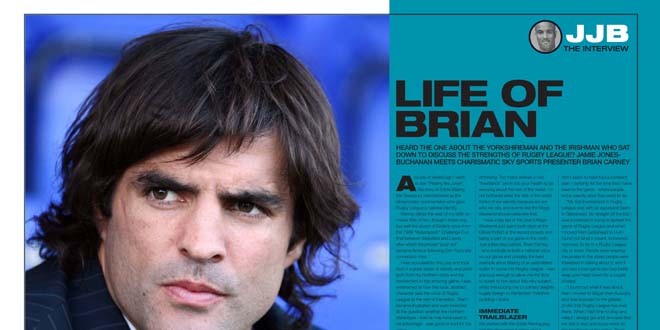 “I remember once playing against Bradford at Valley Parade. I had a shocker, I remember coming home and I rang Matty Johns and said, ‘Mate, I can’t do this any more, I don’t think I am good enough to do this, I’m not up to it.’
“I remember once playing against Bradford at Valley Parade. I had a shocker, I remember coming home and I rang Matty Johns and said, ‘Mate, I can’t do this any more, I don’t think I am good enough to do this, I’m not up to it.’
“He said, ‘Don’t forget the horse that got you up the hill – hard work got you where you are, don’t ever stop doing that’, and that’s always stayed with me. I’d dropped a ball and he told me the best players in the world drop balls, it’s what you do after that. I wrote all those things down at the time and I still have them.
“It reinvigorated me the next day, but I always felt behind; Rugby League never felt natural to me.
“Television is now the same – I’m learning the little tricks and stuffing up big time, let me tell you. It brings me back to when you stuff up on the field, when you do it on TV. We lost to you (Leeds) one year 70-0 then a week later we went out of the Challenge Cup and got beat 75-0 by Saints.
“Wayne Godwin was with me at the time and we couldn’t leave the house. We laugh about it now but then we felt humiliated with how bad things were and if I stuff up royally on TV now I still get that feeling.
“I would say that my academic background has helped me learn. Our TV was thrown out of the house when we were younger, I had to go to school and pretend that I had seen something on TV. You imagine being ten years old in the playground where everyone is talking about a match they saw on the TV last night. I was at the edge of the group nodding and praying no one would turn around and go, ‘What did you think of the game Brian?’ because I would have to parrot what someone else said. I didn’t want to be the kid with no TV.
“My parents said, ‘We will buy you books but we are not having you watch TV’. We were brought up catholic but it wasn’t a (big) religious thing – we lived in the countryside on a lake very much like the lakes up in Cumbria. We had horses, a donkey and a couple of ponies and my dad couldn’t abide watching his kids sat inside watching TV.
“If we were inside he wanted us reading because he was a big reader. If there was a big soccer game on TV I would have to go to my mates house to watch it – once I’d come to terms about not being so embarrassed about it. Dad worked away so we would go to the airport to pick him up and he would come back with a Tin Tin or an Asterix book, which was great reading for kids because its got a broad vocabulary and it’s done in comic book form. I can remember an encyclopedia being a Christmas present for the family one year.
 “Then I went to boarding school and you couldn’t escape study in there – you could try but there were set study periods. My education would have helped me a bit, but the greatest advice I’ve got again from Matty Johns, and I’ll always refer back to him because in my playing and TV career he has been the single most important factor for me. He told me to just be natural and enjoy myself, though it’s so hard to do when it’s three, two one – action!”
“Then I went to boarding school and you couldn’t escape study in there – you could try but there were set study periods. My education would have helped me a bit, but the greatest advice I’ve got again from Matty Johns, and I’ll always refer back to him because in my playing and TV career he has been the single most important factor for me. He told me to just be natural and enjoy myself, though it’s so hard to do when it’s three, two one – action!”
Media relations
I recently had a day down at Sky HQ in London with Michael Shenton, Brett Kearney and Jarrad Sammut. Apart from seeing all the awesome stuff Sky do for sport, including Rugby League, the best part of the day was spending time with those three guys. What a great bunch of blokes and to be fair Rugby League doesn’t create many bad ones. I don’t know if it’s the nature of the game that acts as a centrifuge in bringing all the best characters to the surface but that character of the players is definitely one of our game’s greatest assets.
I was recently told that Sam Tomkins left a hole in his work for Sky, but my perception is that much of Sam’s perceived value was how good he was as a player, as well as how good he was in front of the camera. I know from meeting them that there tons of players out there who would make great TV personalities but unfortunately the majority of players will never be as good as Sam is on the field. Beau Ryan is a great example in the NRL of a player who might not be an international superstar on the pitch, but is a very good player who goes above and beyond to bring to the rest of Australia the personalities that their competition has to offer.
I think we, over here, need to make more of our younger players and fringe players who might not be on the score sheet every week or top of the tackle count but still give a unique perspective to the dynamic characters that make up the whole. That said, Brian makes the point – and I completely agree with him – that the synergy between the media and player still isn’t there yet, and that’s partly down to players needing to make more time for the media for the sake of our game.
“I do wish I was better as a player with the media. I should have been better, in fact I should have been made to do it because I had an obligation to the game, sponsors and clubs to do that, so I will say now I didn’t do it right.
“The way to do it is people like yourself engaging with the media. We are all busy in our lives and you have four kids but you will find time to do a radio interview, and that’s done over the phone. I think we can all find time to do that.
 “I agree we need to create more personalities and profiles in the games – we should have had 20 Sam Tomkins in our competition. But you have also shown part of the problem that it’s people not getting it – that you have to do these radio interviews and go down to London like you guys did where it’s inconvenient.
“I agree we need to create more personalities and profiles in the games – we should have had 20 Sam Tomkins in our competition. But you have also shown part of the problem that it’s people not getting it – that you have to do these radio interviews and go down to London like you guys did where it’s inconvenient.
“Fair play to you and Bret Kearney for going to Sky last week whilst you’re injured, but fair play to Jarrod Sammut and Michael Shenton who went whilst they were fit. I don’t know how many people they asked but if we want more like Sam Tomkins then you tell me who the stars are, I’ll ask them to come down and you explain to me why they’re not going down there.
“We have to, as players, go above and beyond – we can’t sell out our heartlands otherwise. We have a fantastic television deal that will give us security for a long time – we are a very good watch as a sport, and people know Super League. I am proud to say I played the game and when I go and watch it now, wow.
“There are opportunities there but I have seen it first hand, being on the other side of the fence, the difficulties of getting players involved in media. Some players are great, they get it, they say, ‘Ill do that’.
“But the other thing is that some of the filters between the players and Sky aren’t great – a coach or a media officer can take it upon themselves to make the decision that the players are not going to do it, even when a player might be happy to do it. Then we moan about not having a profile. They might send players who are injured or who are on the fringes and may not make it, when they have a star sat next to them.
“I remember even now that some of us went out to do union training with our sleeves rolled up and our shorts half tucked up because of Andy Gregory.”
“I will have to declare I had a very fractious relationship with the media in the last three years of my career. I didn’t really like doing interviews. In the 2006 Tri-Nations I refused to do interviews. My picture was on the side of the team bus because I was playing in Australia and I was vice captain of the Great Britain team and I do wish that someone had physically throttled me and said, ‘You have to do this’. But I had my back up with the media.
“We should all feed off each other – as a player I felt that the media needed me more than I needed them, which in the long run isn’t really true. You all feed off each other and get better coverage for your club and that benefits sponsors. I see that now but I didn’t then.”

